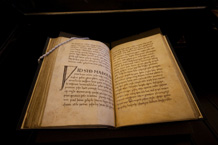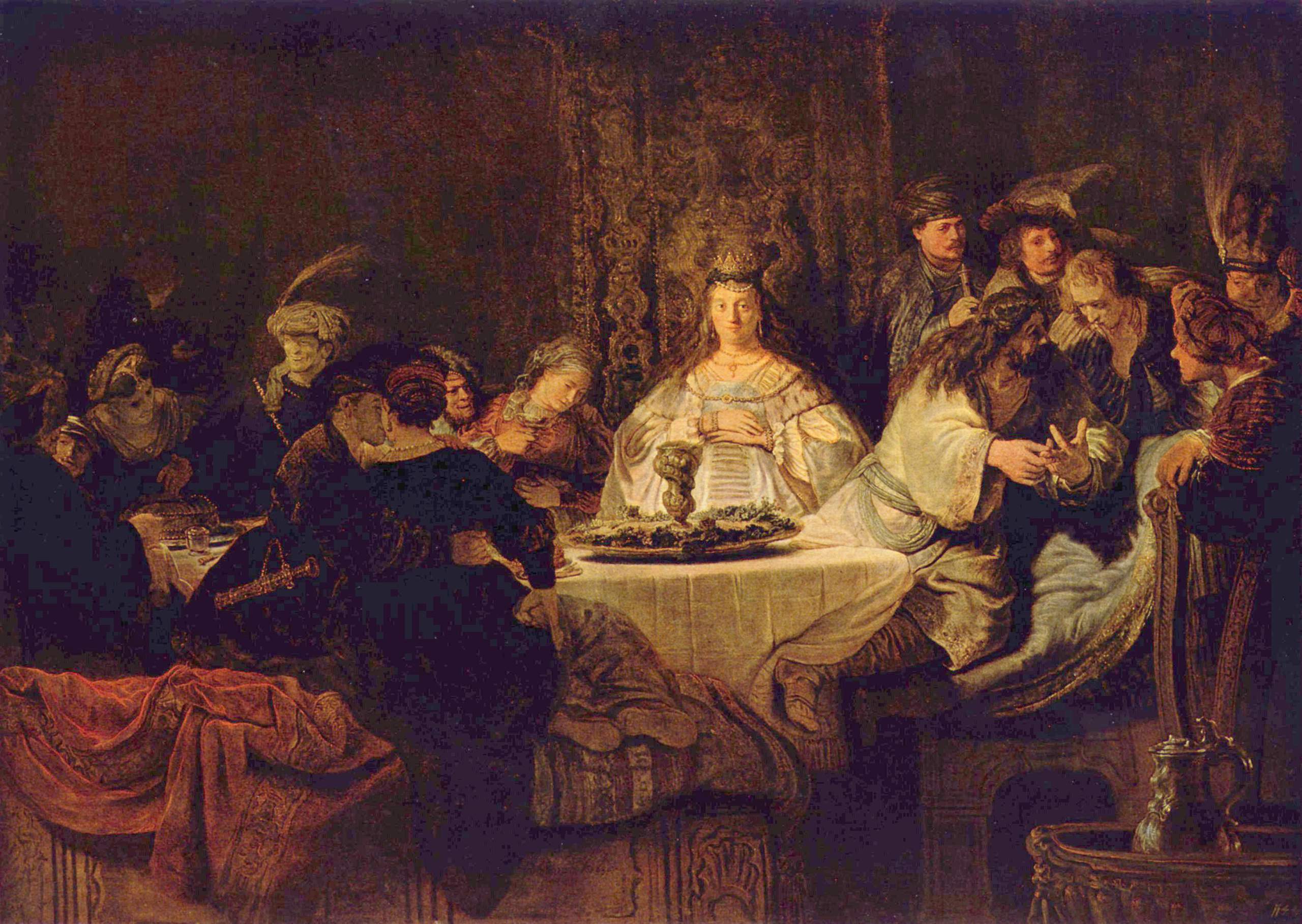|
Exeter Book Riddle 45
Exeter Book Riddle 45 (according to the numbering of the Anglo-Saxon Poetic Records) is one of the Old English Old English (, ), or Anglo-Saxon, is the earliest recorded form of the English language, spoken in England and southern and eastern Scotland in the early Middle Ages. It was brought to Great Britain by Anglo-Saxon settlement of Britain, Anglo ... riddles found in the later tenth-century Exeter Book. Its solution is accepted to be ' dough'. However, the description evokes a penis becoming erect; as such, Riddle 45 is noted as one of a small group of Old English riddles that engage in sexual double entendre, and thus provides rare evidence for Anglo-Saxon attitudes to sexuality, and specifically for women taking the initiative in heterosexual sex. Text and translation As edited by Krapp and Dobbie, the riddle reads:George Philip Krapp and Elliott Van Kirk Dobbie (eds), ''The Exeter Book'', The Anglo-Saxon Poetic Records, 3 (New York: Columbia University Press, 19 ... [...More Info...] [...Related Items...] OR: [Wikipedia] [Google] [Baidu] |
Anglo-Saxon Poetic Records
The Anglo-Saxon Poetic Records (ASPR) is a six-volume edition intended at the time of its publication to encompass all known Old English poetry. Despite many subsequent editions of individual poems or collections, it has remained the standard reference work for scholarship in this field. History The edition was conceived by George Philip Krapp (1872–1934), who edited volumes 1, 2, and 5 while Professor of English at Columbia University, with the assistance of his student and colleague Elliott Van Kirk Dobbie. Krapp died partway through editing volume 3, and Dobbie completed this edition before going on to complete the series by editing volumes 6 (which came out in 1942) and 4 (which emerged in 1953).. According to Henry Wiggins, the long gap before the publication of Volume 4 was partly due to Elliott's feeling that there was no urgency about completing the ''Beowulf'' volume, because there were so many competent editions. The Press, like any publisher, was troubled about the abs ... [...More Info...] [...Related Items...] OR: [Wikipedia] [Google] [Baidu] |
Old English
Old English (, ), or Anglo-Saxon, is the earliest recorded form of the English language, spoken in England and southern and eastern Scotland in the early Middle Ages. It was brought to Great Britain by Anglo-Saxon settlement of Britain, Anglo-Saxon settlers in the mid-5th century, and the first Old English literature, Old English literary works date from the mid-7th century. After the Norman conquest of 1066, English was replaced, for a time, by Anglo-Norman language, Anglo-Norman (a langues d'oïl, relative of French) as the language of the upper classes. This is regarded as marking the end of the Old English era, since during this period the English language was heavily influenced by Anglo-Norman, developing into a phase known now as Middle English in England and Early Scots in Scotland. Old English developed from a set of Anglo-Frisian languages, Anglo-Frisian or Ingvaeonic dialects originally spoken by Germanic peoples, Germanic tribes traditionally known as the Angles, Sa ... [...More Info...] [...Related Items...] OR: [Wikipedia] [Google] [Baidu] |
Anglo-Saxon Riddles
Anglo-Saxon riddles are a significant genre of Anglo-Saxon literature. The riddle was a major, prestigious literary form in early medieval England, and riddles were written both in Latin and Old English verse. The pre-eminent composer of Latin riddles in early medieval England was Aldhelm (d. 709), while the Old English verse riddles found in the tenth-century Exeter Book include some of the most famous Old English poems. History Antique inspirations Riddles are an internationally widespread feature of oral literatures and scholars have not doubted that they were traditional to Old English culture. But the history of riddles as a literary genre in England seems to be rooted in an influential collection of late Antique Latin riddles, possibly from north Africa, attributed to a poet called Symphosius, whose work English scholars emulated and adapted. Aldhelm As the conversion of England to Christianity proceeded during the seventh century, Old English-speakers studied Latin ... [...More Info...] [...Related Items...] OR: [Wikipedia] [Google] [Baidu] |
Exeter Book
The Exeter Book, also known as the Codex Exoniensis or Exeter Cathedral Library MS 3501, is a large codex of Old English poetry, believed to have been produced in the late tenth century AD. It is one of the four major manuscripts of Old English poetry, along with the Vercelli Book in Vercelli, Italy, the Nowell Codex in the British Library, and the Junius manuscript in the Bodleian Library in Oxford. The book was donated to what is now the Exeter Cathedral library by Leofric, the first bishop of Exeter, in 1072. It is believed originally to have contained 130 or 131 leaves, of which the first 7 or 8 have been replaced with other leaves; the original first 8 leaves are lost. The Exeter Book is the largest and perhaps oldest known manuscript of Old English literature, containing about a sixth of the Old English poetry that has come down to us. In 2016, UNESCO recognized the book as "the foundation volume of English literature, one of the world's principal cultural artefa ... [...More Info...] [...Related Items...] OR: [Wikipedia] [Google] [Baidu] |
Dough
Dough is a thick, malleable, sometimes elastic paste made from grains or from leguminous or chestnut crops. Dough is typically made by mixing flour with a small amount of water or other liquid and sometimes includes yeast or other leavening agents, as well as ingredients such as fats or flavorings. Making and shaping dough begins the preparation of a wide variety of foodstuffs, particularly breads and bread-based items, but also including biscuits, cakes, cookies, dumplings, flatbreads, noodles, pasta, pastry, pizza, piecrusts, and similar items. Dough can be made from a wide variety of flour, commonly wheat and rye but also maize, rice, legumes, almonds, and other cereals or crops. Types of dough Doughs vary widely depending on ingredients, the desired end product, the leavening agent (particularly whether the dough is based on yeast or not), how the dough is mixed (whether quickly mixed or kneaded and left to rise), and cooking or baking technique. There is no formal ... [...More Info...] [...Related Items...] OR: [Wikipedia] [Google] [Baidu] |
Penis
A penis (plural ''penises'' or ''penes'' () is the primary sexual organ that male animals use to inseminate females (or hermaphrodites) during copulation. Such organs occur in many animals, both vertebrate and invertebrate, but males do not bear a penis in every animal species, and in those species in which the male does bear a so-called penis, the penises in the various species are not necessarily homologous. The term ''penis'' applies to many intromittent organs, but not to all. As an example, the intromittent organ of most cephalopoda is the hectocotylus, a specialized arm, and male spiders use their pedipalps. Even within the Vertebrata there are morphological variants with specific terminology, such as Hemipenis, hemipenes. In most species of animals in which there is an organ that might reasonably be described as a penis, it has no major function other than intromission, or at least conveying the sperm to the female, but in the Eutheria, placental mammals the peni ... [...More Info...] [...Related Items...] OR: [Wikipedia] [Google] [Baidu] |
Erection
An erection (clinically: penile erection or penile tumescence) is a physiological phenomenon in which the penis becomes firm, engorged, and enlarged. Penile erection is the result of a complex interaction of psychological, neural, vascular, and endocrine factors, and is often associated with sexual arousal or sexual attraction, although erections can also be spontaneous. The shape, angle, and direction of an erection varies considerably between humans. Physiologically, an erection is required for a male to effect vaginal penetration or sexual intercourse and is triggered by the parasympathetic division of the autonomic nervous system, causing the levels of nitric oxide (a vasodilator) to rise in the trabecular arteries and smooth muscle of the penis. The arteries dilate causing the corpora cavernosa of the penis (and to a lesser extent the corpus spongiosum) to fill with blood; simultaneously the ischiocavernosus and bulbospongiosus muscles compress the veins of the ... [...More Info...] [...Related Items...] OR: [Wikipedia] [Google] [Baidu] |
Double Entendre
A double entendre (plural double entendres) is a figure of speech or a particular way of wording that is devised to have a double meaning, of which one is typically obvious, whereas the other often conveys a message that would be too socially awkward, sexually suggestive, or offensive to state directly. A double entendre may exploit puns or word play to convey the second meaning. Double entendres generally rely on multiple meanings of words, or different interpretations of the same primary meaning. They often exploit ambiguity and may be used to introduce it deliberately in a text. Sometimes a homophone can be used as a pun. When three or more meanings have been constructed, this is known as a "triple entendre", etc. Etymology According to the Merriam-Webster Unabridged Dictionary and the Oxford English Dictionary, the expression comes from the rare and obsolete French expression, which literally meant "double meaning" and was used in the senses of "double understanding ... [...More Info...] [...Related Items...] OR: [Wikipedia] [Google] [Baidu] |
Hugh Magennis (scholar)
Hugh Magennis is a scholar of Old English and the author of several books on Anglo-Saxon society and poetry, including especially ''Beowulf''. Biography Hugh Magennis gained his bachelor's degree at Queen's University Belfast in 1970. He obtained his master's degree there in 1972 and his PhD also there in 1981. He joined the staff of the university in the 1970s, becoming a full professor, head of its School of English and director of its Institute of Theology. He served from 2004 as chair of the Teachers of Old English in Britain and Ireland, and from 2011 its honorary president. Honours and distinctions A ''festschrift'' called ''Saints and Scholars: New Perspectives on Anglo-Saxon Literature and Culture in Honour of Hugh Magennis'', was published in 2012. A collection of studies in his honour, entitled "Holy and Unholy Appetites in Anglo-Saxon England" was published the same year in ''English Studies''. Magennis became a member of the Royal Irish Academy in 2006. He is a Fe ... [...More Info...] [...Related Items...] OR: [Wikipedia] [Google] [Baidu] |
Riddles
A riddle is a statement, question or phrase having a double or veiled meaning, put forth as a puzzle to be solved. Riddles are of two types: ''enigmas'', which are problems generally expressed in metaphorical or allegorical language that require ingenuity and careful thinking for their solution, and ''conundra'', which are questions relying for their effects on punning in either the question or the answer. Archer Taylor says that "we can probably say that riddling is a universal art" and cites riddles from hundreds of different cultures including Finnish, Hungarian, American Indian, Chinese, Russian, Dutch and Filipino sources amongst many others. Many riddles and riddle-themes are internationally widespread. In the assessment of Elli Köngäs-Maranda (originally writing about Malaitian riddles, but with an insight that has been taken up more widely), whereas myths serve to encode and establish social norms, "riddles make a point of playing with conceptual boundaries and cross ... [...More Info...] [...Related Items...] OR: [Wikipedia] [Google] [Baidu] |
Old English Literature
Old English literature refers to poetry and prose written in Old English in early medieval England, from the 7th century to the decades after the Norman conquest of England, Norman Conquest of 1066, a period often termed Anglo-Saxon England. The 7th-century work ''Cædmon's Hymn'' is often considered as the oldest surviving poem in English, as it appears in an 8th-century copy of Bede's text, the ''Ecclesiastical History of the English People''. Poetry written in the mid 12th century represents some of the latest post-Norman examples of Old English. Adherence to the grammatical rules of Old English is largely inconsistent in 12th-century work, and by the 13th century the grammar and syntax of Old English had almost completely deteriorated, giving way to the much larger Middle English literature, Middle English corpus of literature. In descending order of quantity, Old English literature consists of: sermons and saints' lives; biblical translations; translated Latin works of the ... [...More Info...] [...Related Items...] OR: [Wikipedia] [Google] [Baidu] |



.jpg)



